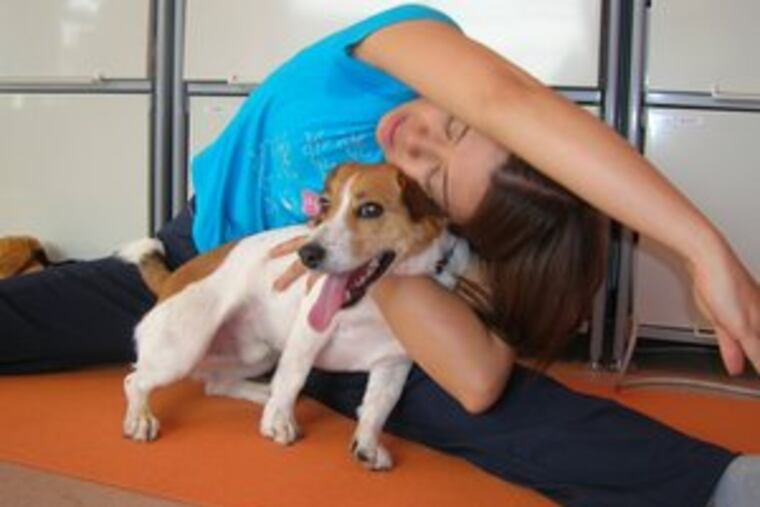It's a Dog's Life
TOKYO - This is no ordinary yoga class. The session begins with participants barking and smelling each other's bottoms. Shortly thereafter, someone pees on one of the brightly colored yoga mats. And a few times during the 90-minute class, one of the male participants straddles a female, a position not found in most yoga routines.

TOKYO - This is no ordinary yoga class. The session begins with participants barking and smelling each other's bottoms. Shortly thereafter, someone pees on one of the brightly colored yoga mats. And a few times during the 90-minute class, one of the male participants straddles a female, a position not found in most yoga routines.
Welcome to dog yoga.
Standing in the "tree position," balanced on one leg with her 3-year-old shih tzu held overhead, 32-year-old Sonoko Tsukahara seems typical of Japan's new breed of dog owner. The advertising executive bought Pokum for the equivalent of about $1,500 when she was single and living alone and had no idea whether or when that status would change.
"We have dogs to keep us company," said Tsukahara, who is now married but childless. "This is our replacement for children."
Peek into any stroller on Tokyo's fashionable streets these days and you're likely to see - nestled in the bassinet between cashmere blankets, dressed in a high-priced designer jacket with matching hat - a handbag-size pedigreed pup.
With fewer Japanese marrying, and those who are marrying having fewer children, the Japanese have found a new object for their affections and disposable income - dogs.
And the pets are pampered with accessories and services so lavish they wouldn't be out of place in a
Far Side
cartoon: a dog old-age home, a Honda concept car with seat belts for dogs, dog recipe books, and dog dance studios.
Japan now has 13 million dogs. That places it just behind the United States, China and Brazil in dog ownership. And the number is increasing 2.4 percent a year.
Meanwhile, Japan's human population is stagnating, increasing only 0.2 percent a year. Earlier this month, the Japanese government announced that the percentage of children in the population had fallen again for the 27th straight year.
"Dogs are partly a replacement for children and also a replacement for husbands," explained Robert Dujarric, director of the Institute for Contemporary Japanese Studies at Temple University's campus in Tokyo. "In the West, the dog is a companion for children. Here, that isn't the case. Here, they are often a companion for lonely young women."
Japan's dog craze began 14 years ago when the crown princess of Japan, Masako, appeared on TV with her terrier. Style-conscious Japanese followed suit and soon took the next step and began dressing up their pets. The dogs of Japan might be small (usually shih tzus and miniature poodles and dachshunds to fit tiny apartments), but the accessories, the pampering possibilities, and their price tags are now big business.
"When I see a naked dog here in Tokyo, I'm shocked," said Dujarric.
Tsukahara, for example, coddles her dog the way most new mothers spoil their babies, spending the equivalent of about $100 per month on dog fashion accessories, dog yoga, and dog
onsens
(traditional Japanese spring-fed hot baths).
Japanese spend an estimated $10 billion per year on their pets. (That is about one-third what Americans spend on theirs.) And the Japanese pet-accessory industry is growing at 3 percent a year.
Tokyo now boasts dog cafes serving up organic food for humans and dogs alike (hamburgers for dogs run about $9). Spas and hair salons offer two-fer massage, haircut, coloring, so obliging owner and posh pooch can get matching dos. Office-supply stores print the essential Japanese
meishi
, business card, for dogs. And wedding planners can find just the right gown to fit the curves on the dalmatian bride and source a perfect wedding cake to serve four-legged guests after the ceremony.
American luxury dog-accessory manufacturers, eager to get a piece of the action, staged Japan's first dog fashion show earlier this year. The show, which featured humans and dogs strutting down the runway sporting matching couture, featured a $20,000 crystal-studded dog coat.
The Kansas City-based Three Dogs Bakery has opened seven locations in Japan, selling whole wheat and all-natural peanut butter dog bones ($12.95).
But the American-designed, Chinese-made dog accessories increasingly available in the United States don't sell here, said Isaac Negishi, owner of a Tokyo dog fashion shop that specializes in clothes for Italian greyhounds and whose hand-tailored winter coats run up to $800 each.
"The Japanese," said Negishi, "prefer quality goods, and they are prepared to spend a lot for it."
For Noriko Onuma, who developed dog yoga in 2004 and has trained all of Tokyo's 12 dog-yoga instructors, this is all a symptom of the stress in Japanese society.
"Dogs give us peace," said Onuma, who maintains that dog yoga helps owners connect more deeply with their dogs and helps calm both dogs and owners. "People in Japan are isolated. But we are eager for love. Dogs are a bridge between people."